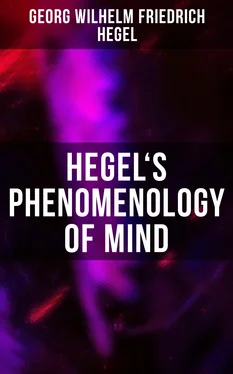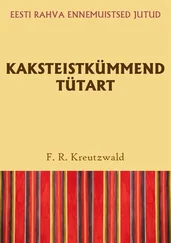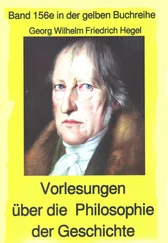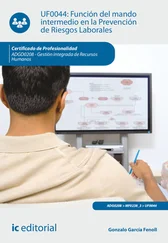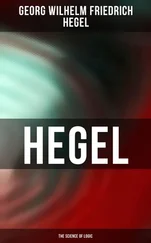For the rest it is not difficult to see that our epoch is a birth-time, and a period of transition. The spirit of man has broken with the old order of things hitherto prevailing, and with the old ways of thinking, and is in the mind to let them all sink into the depths of the past and to set about its own transformation. It is indeed never at rest, but carried along the stream of progress ever onward. But it is here as in the case of the birth of a child; after a long period of nutrition in silence, the continuity of the gradual growth in size, of quantitative change, is suddenly cut short by the first breath drawn-there is a break in the process, a qualitative change and the child is born. In like manner the spirit of the time, growing slowly and quietly ripe for the new form it is to assume, disintegrates one fragment after another of the structure of its previous world. That it is tottering to its fall is indicated only by symptoms here and there. Frivolity and again ennui, which are spreading in the established order of things, the undefined foreboding of something unknown-all these betoken that there is something else approaching. This gradual crumbling to pieces, which did not alter the general look and aspect of the whole, is interrupted by the sunrise, which, in a flash and at a single stroke, brings to view the form and structure of the new world.
But this new world is perfectly realized just as little as the new-born child; and it is essential to bear this in mind. It comes on the stage to begin with in its immediacy, in its bare generality. A building is not finished when its foundation is laid; and just as little, is the attainment of a general notion of a whole the whole itself. When we want to see an oak with all its vigour of trunk, its spreading branches, and mass of foliage, we are not satisfied to be shown an acorn instead. In the same way science, the crowning glory of a spiritual world, is not found complete in its initial stages. The beginning of the new spirit is the outcome of a widespread revolution in manifold forms of spiritual culture; it is the reward which comes after a chequered and devious course of development, and after much struggle and effort. It is a whole which, after running its course and laying bare all its content, returns again to itself; it is the resultant abstract notion of the whole. But the actual realization of this abstract whole is only found when those previous shapes and forms, which are now reduced to ideal moments of the whole, are developed anew again, but developed and shaped within this new medium, and with the meaning they have thereby acquired.
While the new world makes its first appearance merely in general outline, merely as a whole lying concealed and hidden within a bare abstraction, the wealth of the bygone life, on the other hand, is still consciously present in recollection. Consciousness misses in the new form the detailed expanse of content; but still more the developed expression of form by which distinctions are definitely determined and arranged in their precise relations. Without this last feature science has no general intelligibility, and has the appearance of being an esoteric possession of a few individuals — an esoteric possession, because in the first instance it is only the essential principle or notion of science, only its inner nature that is to be found; and a possession of few individuals, because, at its first appearance, its content is not elaborated and expanded in detail, and thus its existence is turned into something particular. Only what is perfectly determinate in form is at the same time exoteric, comprehensible, and capable of being learned and possessed by everybody. Intelligibility is the form in which science is offered to everyone, and is the open road to it made plain for all. To reach rational knowledge by our intelligence is the just demand of the mind which comes to science. For intelligence, understanding ( Verstand ), is thinking, pure activity of the self in general; and what is intelligible ( Verständige ) is something from the first familiar and common to the scientific and unscientific mind alike, enabling the unscientific mind to enter the domain of science.
Science, at its commencement, when as yet it has reached neither detailed completeness nor perfection of form, is exposed to blame on that account. But it would be as unjust to suppose this blame to attach to its essential nature, as it is inadmissible not to be ready to recognize the demand for that further development in fuller detail. In the contrast and opposition between these two aspects (the initial and the developed stages of science) seems to lie the critical knot which scientific culture at present struggles to loosen, and about which so far it is not very clear. One side parades the wealth of its material and the intelligibility of its ideas; the other pours contempt at any rate on the latter, and makes a parade of the immediate intuitive rationality and divine quality of its content. Although the first is reduced to silence, perhaps by the inner force of truth alone, perhaps, too, by the noisy bluster of the other side, and even though having regard to the reason and nature of the case it did feel overborne, yet it does not therefore feel satisfied as regards those demands for greater development; for those demands are just, but still unfulfilled. Its silence is due only in part to the victory of the other side; it is half due to that weariness and indifference which are usually the consequence when expectations are being constantly awakened by promises which are not followed up by performance.
The other side no doubt at times makes an easy enough matter of having a vast expanse of content. They haul on to their territory a lot of material, that, namely, which is already familiar and arranged ill order; and since they are concerned more especially about what is exceptional, strange, and curious, they seem all the more to be in possession of the rest, which knowledge in its own way was finished and done with, as well as to have control over what was unregulated and disorderly. Hence everything appears brought within the compass of the Absolute Idea, which seems thus to be recognized in everything, and to have succeeded in becoming a system in extenso of scientific knowledge. But if we look more closely at this expanded system we find that it has not been reached by one and the same principle taking shape in diverse ways; it is the shapeless repetition of one and the same idea, which is applied in an external fashion to different material, the wearisome reiteration of it keeping up the semblance of diversity. The Idea, which by itself is no doubt the truth, really never gets any farther than just where it began, as long as the development of it consists in nothing else than such a repetition of the same formula. If the knowing subject carries round everywhere the one inert abstract form, taking up in external fashion whatever material comes his way, and dipping it into this element, then this comes about as near to fulfilling what is wanted — viz. a self-origination of the wealth of detail, and a self-determining distinction of shapes and forms-as any chance fancies about the content in question. It is rather a monochrome formalism, which only arrives at distinction in the matter it has to deal with, because this is already prepared and well known.
This monotonousness and abstract universality are maintained to be the Absolute. This formalism insists that to be dissatisfied therewith argues an incapacity to grasp the standpoint of the Absolute, and keep a firm hold on it. If it was once the case that the bare possibility of thinking of something in some other fashion was sufficient to refute a given idea, and the naked possibility, the bare general thought, possessed and passed for the entire substantive value of actual knowledge; similarly we find here all the value ascribed to the general idea in this bare form without concrete realization; and we see here, too, the style and method of speculative contemplation identified with dissipating and. resolving what is determinate and distinct, or rather with hurling it down, without more ado and without any justification, into the abyss of vacuity. To consider any specific fact as it is in the Absolute, consists here in nothing else than saying about it that, while it is now doubtless spoken of as something specific, yet in the Absolute, in the abstract identity A = A, there is no such thing at all, for everything is there all one. To pit this single assertion, that “in the Absolute all is one”, against the organized whole of determinate and complete knowledge, or of knowledge which at least aims at and demands complete development-to give out its Absolute as the night in which, as we say, all cows are black-that is the very naïveté of emptiness of knowledge.
Читать дальше
